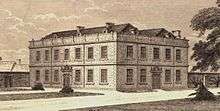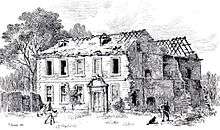Crook Hall
Crook Hall, sited near Lanchester, County Durham some 8 miles north west of the city of Durham, was one of two Roman Catholic seminaries which temporarily replaced the Douai seminary in Douai, France when that college was suppressed soon after the French Revolution. Crook Hall was itself superseded after a few years by Ushaw College.[1]
The hall had belonged to the Baker family since 1635 and was remodelled in 1716 by George Baker, MP for Durham City.


When the Douai Catholic seminary closed in 1793 the students were hastily brought back to England with the intention of creating a new seminary there. The refugee students were divided into two groups, one of which (mainly composed of students who were destined for the Northern Vicariate) moved on 15 October 1794 into Crook Hall, which had been leased from George Baker. There they studied under the guidance of Thomas Eyre, one of the former professors, John Lingard, the future historian and John Daniel, the president of Douai at its suppression. After ten years Crook Hall proved inadequate and in 1804 Bishop William Gibson began the building of Ushaw College at nearby Ushaw Moor, to which the college transferred in 1808. [2]
The local village of Crookhall developed as coal and iron ore deposits were exploited. The hall was purchased by the Consett Iron Company in 1877 and demolished circa 1900. [3]
References
- ↑
 Herbermann, Charles, ed. (1913). "Ushaw College". Catholic Encyclopedia. New York: Robert Appleton Company.
Herbermann, Charles, ed. (1913). "Ushaw College". Catholic Encyclopedia. New York: Robert Appleton Company. - ↑ "Ushaw College". New Advent. Retrieved 26 July 2014.
- ↑ "Local History". The Crookhall Foundation. Retrieved 26 July 2014.
Coordinates: 54°51′04″N 1°48′35″W / 54.8512°N 1.8097°W